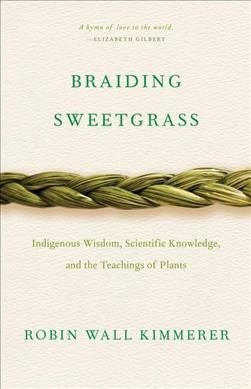This book is a gift.
It was given to me by Jackie Bradley, whom I met through the Bowen in Transition Offering Circle. I made an offer, she accepted, and soon we found ourselves in beautiful cycle of reciprocity without a hint of obligation.
It was early December when Jackie put Braiding Sweetgrass, by Robin Wall Kimmerer, in my hands.
In the preceding months as the days grew shorter and the news cycle grew darker, I had been fighting an overwhelming feeling of pessimism about the world. To be more precise, I was feeling particularly pessimistic about human beings and their impact on the world.
Robin Wall Kimmerer forced me to reconsider my pessimism.
In the first chapter, Kimmerer tells the story of Skywoman, who fell to earth when it was covered in water. After being rescued by the otters, the muskrats, the fish and the birds and so on, Skywoman “sang in thanksgiving and then began to dance, her feet caressing the earth. The land grew and grew as she danced her thanks, from the dab of mud on Turtle’s back until the whole Earth was made. Not by Skywoman alone, but from the alchemy of all the animals’ gifts coupled with her deep gratitude.”
Skywoman also happened to bring seeds with her and as she planted them. She provided an abundance of new foods for her animal friends.
Kimmerer contrasts this myth to the story of Adam and Eve. The descendants of both Eve and Skywoman met here on Turtle Island, she writes, and the land still bears the scars of this meeting.
“They say hell hath no fury like a woman scorned. I can only imagine the conversation between Eve and Skywoman: sister, you got the short end of the stick.”
Indeed.
For me, Eve’s story always did point to the mean, furious, vengeful God aiming to instill fear. After this comparison, the Euro-Christian foundation myth sounds even worse. What a way to treat the first mother! Never mind the impact on human curiosity and people’s relationship to beauty. Is this where the self-loathing started? I ask myself again, would the world be better off without humans?
The answer, despite everything, is no.
We’ve got learn our purpose here and dive into it.
Braiding Sweetgrass explores that purpose through the author’s relationship with the plants and animals around her. That relationship is both simple and complicated.
Take the entire chapter devoted to “A Mother’s Work.” This is the story of a years-long project to “rehabilitate” a small pond to make it swimmable for the author’s children. In the process of caring for the pond, Kimmerer becomes the reluctant executioner to countless tadpoles and plants. She questions her own narrow interests and the meaning of “good.” The work, as it turns out, is not about reaching the desired outcome but the relationship that develops in the meantime.
“The pond built my muscles, wove my baskets, mulched my garden, made my tea and trellised my morning glories. Our lives became entwined in ways both material and spiritual. It’s been a balanced exchange: I worked on the pond and the pond worked on me, and together, we made a good home.”
As for the simple aspect of the relationship between the earth and her humans, there is just one word: gratitude.
When we love the land, the land loves us back, and our co-evolution with plants proves it.
“The sweeter the peach, the more frequently we disperse its seeds, nurture its young and protect them from harm.”
This, is reciprocity.
My copy of this book is littered with bookmarks, underlines, notes in the margins. Every page is rich with beauty and the kind of truth that runs deeper than shifting statistics. It’s the truth of love, the opening of a window into a world where human beings are not plagued by isolation and constantly driven by not being enough, not having enough. This is one way to explain Inner Transition: it’s the emotional and spiritual work of learning to cope with and adapt to the damage we’ve done to our planet. If that sounds like something you’d like to delve into, Bowen In Transition will be hosting a meeting on this subject on January 20. (See below and on the calendar for more details.)
The book also offers a refreshing and relatable shift in world-view. Robin Wall Kimmerer is a citizen of the Ptawatomi Nation and a professor of environmental and forest biology. On top of everything else, Braiding Sweetgrass is a book about reconciling science and Indigenous knowledge. Rich conversations are sure to come out of discussions at upcoming Knowing Our Place book club meetings.
If meetings are not your thing, no problem, but put Braiding Sweetgrass on your 2019 reading list.
Bowen in Transition Potluck and discussion on “Inner Transition”
Sunday January 20th, 12pm - 3:30pm
Call Shasta Martinuk for details at 947-2283
Knowing Our Place Book Club
Discussions on Braiding Sweetgrass, January 26, February 16
11-12:30 at the Library
email [email protected] to register



